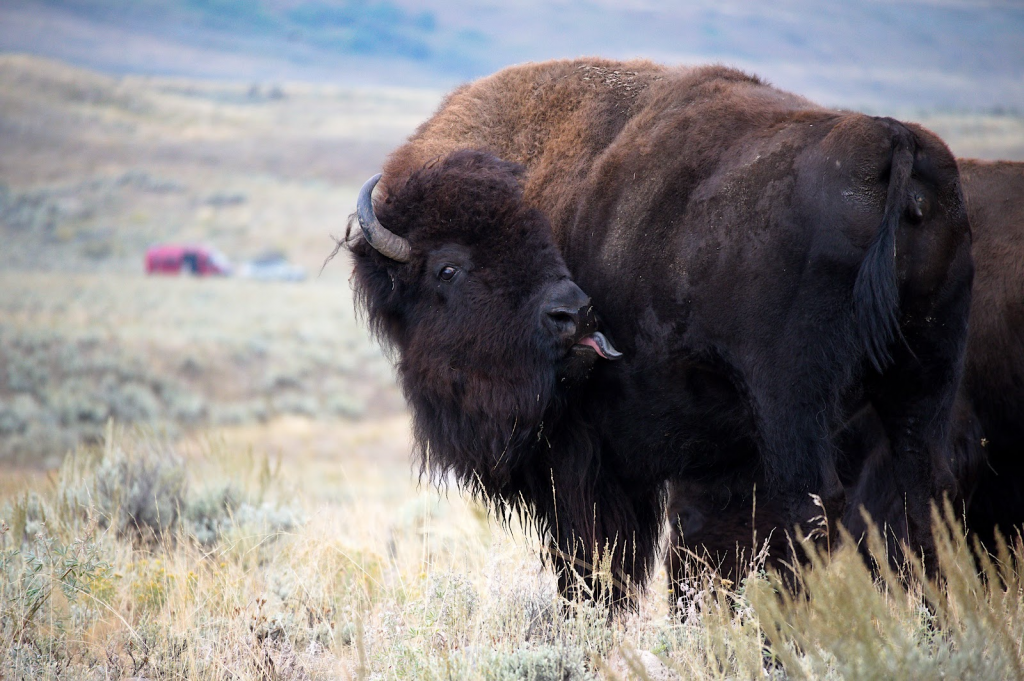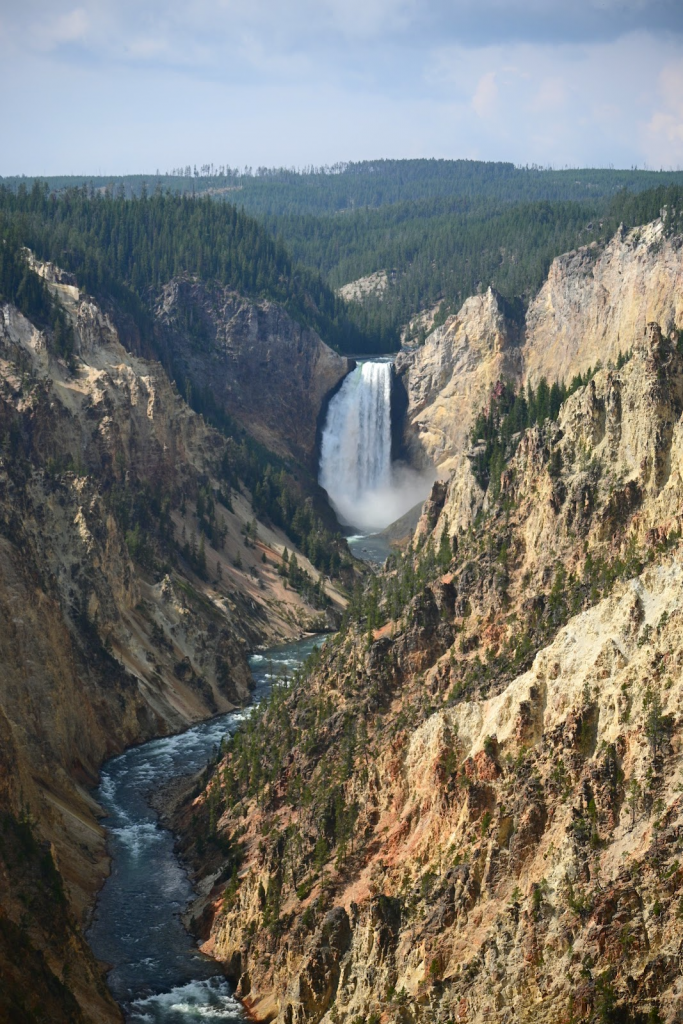
Top 10 Things to Do At Yellowstone National Park

Yellowstone isn’t just a park—it’s a full-blown natural wonderland. Sure, it’s famous for geysers that erupt like clockwork, technicolor hot springs, and bubbling mud pots that look like they belong on another planet. But that’s just the beginning.
This park is over 2 million acres of untamed beauty, where bison jam the roads, wolves roam free, and grizzly bears rule the ridgelines. Waterfalls thunder through lush canyons. Mountains scrape the clouds. And yes, the ground literally steams beneath your feet thanks to the mighty supervolcano simmering below.
Whether you’re a wildlife fanatic, a waterfall chaser, or just here for the road trip of a lifetime—Yellowstone delivers.
So how do you make sure you don’t miss the good stuff?
Easy.
Here are Shaka Guide’s Top Ten favorite things to do and see at Yellowstone National Park!
10 Must-see Yellowstone Highlights
1. Watch the Eruption at Old Faithful


Photo by Rachel Ennis
Watch the world-famous geyser erupt at Old Faithful, which spouts water up to 180 feet in the air. The eruptions happen approximately every 90 minutes (although it’s not always punctual) and draw large crowds, so it’s best to get to the viewing area early. While you’re waiting, you can also explore smaller geysers along the boardwalk. And, you can check out the visitor center, gift shop, museum, and ice cream shop!
2. Stroll the Boardwalks at Grand Prismatic Spring


Photo by Rachel Ennis
Grand Prismatic Spring is one of the largest hot springs in the world. Its colorful layers of water are a sight to behold, and there are several boardwalks that allow visitors to get a closer look. Careful, though. The water in these hot springs is nearly 200 degrees Fahrenheit, which means that swimming is strictly prohibited—because it could kill you. No, but, really. Stay on the boardwalk, folks.
3. Go Fishin’ at Yellowstone Lake


Photo by Rachel Ennis
Cast your line into Yellowstone Lake, the largest high-elevation lake in North America. The lake is over 7,000 feet above sea level, and it’s full of Brown, Rainbow, Brook, and Lake Trout! Just remember, the lake is also home to the endangered Cutthroat Trout, so while the park encourages keeping or killing the non-native Lake Trout, it has a strict catch-and-release policy for the red-slashed Cutthroat.
Even if fishing isn’t your thing, the lake still has plenty to do. Why not rent a boat and spend a lazy day on the lake? Yellowstone Lake is surrounded by serene, mountain scenery, so let your mind wander as you drift peacefully along.
4. Watch the Wildlife in Lamar Valley


Photo by Rachel Ennis
The Lamar Valley is unofficially known as the "Serengeti of North America" because of its high concentration of wildlife. Wildlife in Yellowstone is diverse—there's bison, elk, wolves, bears...you name it! Just remember to keep a safe distance—you might even want to bring binoculars and a long camera lens.
You can explore Lamar by car (the scenic drive is stunning), or stretch your legs on a few trails. Options range from flat valley walks to more challenging hikes that climb into the surrounding hills—perfect for spotting wildlife from a safe and respectful distance.
Just remember: animals here are wild and unpredictable. Stay at least 100 yards from bears and wolves, and 25 yards from all other wildlife. The photo’s not worth the hospital visit.
Writer’s Tip: Want to really see Yellowstone’s wild side? Arrive early—like sunrise-early. The hours just before and after dawn are prime time for spotting wildlife in Yellowstone.
5. Take a Hike


Photo by Rachel Ennis
Take a hike—literally! Yellowstone has over 900 miles of hiking trails, ranging from easy boardwalk strolls to challenging backcountry adventures. If you're short on time, explore the scenic overlooks and short trails along the Grand Canyon of the Yellowstone, where you'll catch jaw-dropping views of the Upper and Lower Falls. For panoramic views, tackle the Mount Washburn Trail—a moderately strenuous hike that’s one of the best for spotting wildlife like bighorn sheep. And don’t skip the Fairy Falls Trail, an easy-to-moderate hike leading to one of Yellowstone’s most beautiful waterfalls, with a bonus view of Grand Prismatic Spring along the way. Check out Shaka Guide’s Yellowstone Hiking Guide for a full list of our favorites!
6. Explore the Mammoth Hot Springs


Photo by Rachel Ennis
Explore the terraces and formations of Mammoth Hot Springs, a unique geothermal area with hot springs that have created intricate and colorful formations over time.
7. Go For a Swim!


Yellowstone National Park, Public domain, via Wikimedia Commons
Yes, you can swim in Yellowstone National Park!
One of the most popular (and safe) spots is the Firehole River Swim Area, located off Firehole Canyon Drive near Madison Junction. In summer, when conditions allow, you can cool off in this section of the river where geothermal runoff has gently warmed the water. It’s a scenic dip surrounded by cliffs, currents, and a whole lot of natural wonder. This swim area will be marked, but there's another, less known unofficial swimming area a little further downstream, where the river loops around.
If you're willing to take a buggy, backcountry hike (17 long miles!), you can swim in the Dunada Falls Hot Spring. You'll start your journey from the Belcher Ranger Station, in the southwest corner of the park.
You may have also heard of the Boiling River, near Yellowstone’s North Entrance. This spot was famous for its unique mix of cold river water and hot springs, creating a natural warm soak.
Note: The Boiling River swimming area is currently closed due to damage from the historic 2022 floods, and remains closed as of 2025. It is unlikely to reopen for swimming.
Important Safety Reminder: Swimming anywhere else in Yellowstone is strictly prohibited. Many of the park’s rivers are dangerously cold and fast-moving, and thermal areas can be boiling hot, acidic, or unstable underfoot. Always obey posted signs and stay in designated areas.
8. Fall for the Waterfalls


Virginia Cascades; photo by Rachel Ennis
Yellowstone National Park is home to nearly 300 stunning waterfalls, each with its own unique features. One of the most popular waterfalls is the Lower Falls, in the Grand Canyon of the Yellowstone which plunges 308 feet into the Yellowstone River. The Upper Falls, located upstream, drops 109 feet over a series of smaller cascades.
hello
Another noteworthy waterfall is the Tower Fall, which is surrounded by towering cliffs and is 132 feet tall. Other waterfalls in the park include Gibbon Falls, Kepler Cascades, and Mystic Falls, each offering its own mesmerizing views and experiences.
But one of our personal favorites? Virginia Cascades. It may not be the tallest, but there’s something magical about watching it tumble through the pine forest like a silver ribbon. Quiet, tucked away, and often overlooked—it’s Yellowstone at its most peaceful.
9. Explore the Other Grand Canyon


Photo by Rachel Ennis
And speaking of the Upper and Lower Falls, The Grand Canyon of Yellowstone is a breathtaking natural wonder that you’ll definitely want to include in your itinerary. There are several things to do at the Grand Canyon of Yellowstone, including hiking along the South Rim Trail, which provides stunning views of the canyon and its waterfall.
Another popular activity is to visit the Artist Point overlook, which offers a panoramic view of the canyon and its colorful rock formations. Visitors can also take a guided tour or attend a ranger program to learn more about the history and geology of the area.
When hunger strikes, you’ll find several restaurants in the nearby Canyon Village. Or, if you’d rather dine al fresco, there are picnic areas with stunning canyon or forest views—perfect for a meal surrounded by nature.
10. Snap Some Pics of Roosevelt Arch


Yellowstone National Park, Public domain, via Wikimedia Commons
"For the benefit and enjoyment of the people."
Those are the words President Theodore Roosevelt used in 1903 when he dedicated Yellowstone as a National Park, and those words are etched on the top of the Roosevelt Arch. The arch marks the gateway to the north entrance of the park and still stands as a symbol of the park's natural beauty and significance.
While you’re there, don’t miss a visit to the nearby town of Gardiner, Montana. This charming little gateway community offers cozy cafes, souvenir shops, and even some local wildlife sightings—elk are known to wander right through town!
Best Things To Do In Yellowstone On A Map
Ready to pack your bags? This is just the tip of the iceberg when it comes to things to do in Yellowstone. The park has over 900 hikes, 500 geysers, swimming holes, scenic lookouts, historic sites, and more! Not sure where to begin?
Let Shaka Guide do the planning for you! Download the Yellowstone National Park Tour as your personal guide to this one-of-a-kind park.

Jess Conaway is a small-town mom and former theater kid who grew up exploring the Gettysburg Battlefield, and she’s been a history buff ever since. Jess has a passion for preserving our nation’s stories, but she especially loves discovering the human history of the places she visits—the weirder, the better!
She’s also not ashamed to admit that she cried the first time she saw the sun rise over the Tetons.
We hope that we’ve given you all the information you need to make the most of your day. Your vacation is extremely important to us so if you have any questions feel free to reach out at aloha@shakaguide.com.
For more detailed information to help you plan, check out our 7-Day Yellowstone Itinerary, 3-Day Yellowstone Itinerary, and Know Before You Go article.
Like this article? Share it on Pinterest!

RELATED ARTICLES:
Yellowstone and Grand Teton Two Days Itinerary
Yellowstone vs Grand Teton—Which Park is Right for You?
The Best Hikes at Yellowstone National Park
Our 12 Favorite Yellowstone Hot Springs and Where to Find Them
Top 20 Best Waterfalls in Yellowstone National Park
Discovering Yellowstone's Hidden Gems
The Best Geysers You'll See in Yellowstone
What state is Yellowstone National Park in?
Yosemite vs. Yellowstone: Which National Park to Visit?
Driving from Mount Rushmore to Yellowstone






















 to fuel your ride
to fuel your ride 
